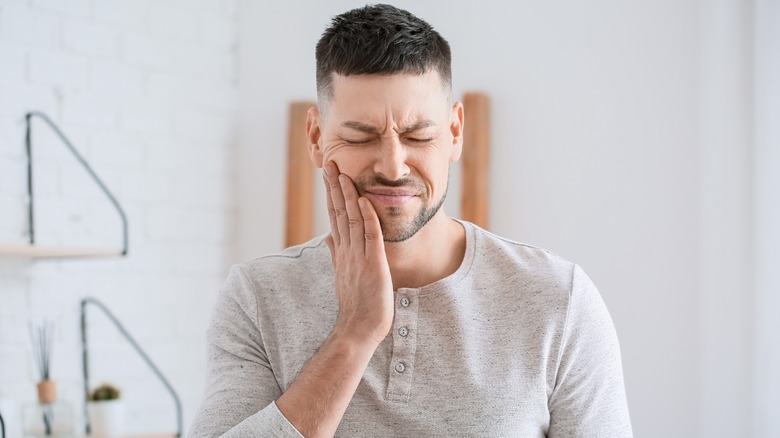If you have been noticing your gums bleeding while brushing your teeth, this could be a sign of gum disease, also known as periodontal disease. However, don’t think you’re alone. Over 47% of American adults aged 30 and older have some sort of gum disease. And the condition tends to worsen as you get older, affecting more than 70% of adults over 65 years old, according to the U.S. Centers for Disease Control and Prevention (CDC).
The cause of gum disease is bacteria infecting the gums. The bacteria sticks to your teeth, becoming plaque that then hardens into tartar that can get beneath your gum line and lead to gum disease. Tartar is hard to eliminate and typically requires a dental professional. Besides bleeding, other signs of gum disease include bad breath, swollen gums, and sensitivity while chewing, per the CDC.
Gum disease comes in two stages. Gingivitis is the early stage and when you’ll first notice swollen or bleeding gums. Or, in some cases, you may not be aware you even have it. Gingivitis has a good chance of resolving if treated early, according to the experts at Cleveland Clinic.
However, if the infection advances, it can evolve into periodontitis, which is potentially much more serious. If you have periodontitis, your gums will pull away from your teeth, leaving pockets between your gums and teeth. Bone is lost and you are also at risk of losing teeth, according to the CDC.
How to address gum disease

If you have gingivitis, even if you are not experiencing severe dental discomfort, do not expect it to heal on its own. However, there are some home remedies you can try before taking the step to visit a dentist. These methods include rinsing with salt water (a natural disinfectant) or mouthwash. Also, swishing around certain oils with anti-inflammatory properties for 20 to 30 minutes, such as coconut oil, may help reduce gingivitis symptoms, per Healthline.
However, if your gum disease is more severe, you should see a dental professional for treatment. Depending on the nature of your gum disease, treatments range from surgical options, such as pocket reduction surgery, which helps to remove tartar and repair damaged bone, and bone and tissue grafts. For less severe conditions, your dentist may be able to remedy your issue with non-surgical methods, such as deep cleaning under a local anesthetic — also called scaling and root planing — where your dentist scrapes away plaque and tartar above and below your gum line and smooths your teeth. This process removes bacteria and allows your gums to reattach to your teeth, per WebMD.
While there are genetic factors involved that can make someone more predisposed to gum disease, you can help reduce your risk by brushing and flossing daily, visiting a dentist one to two times each year for checkups and cleanings, quitting smoking, and getting proper nutrition (per Mayo Clinic).




